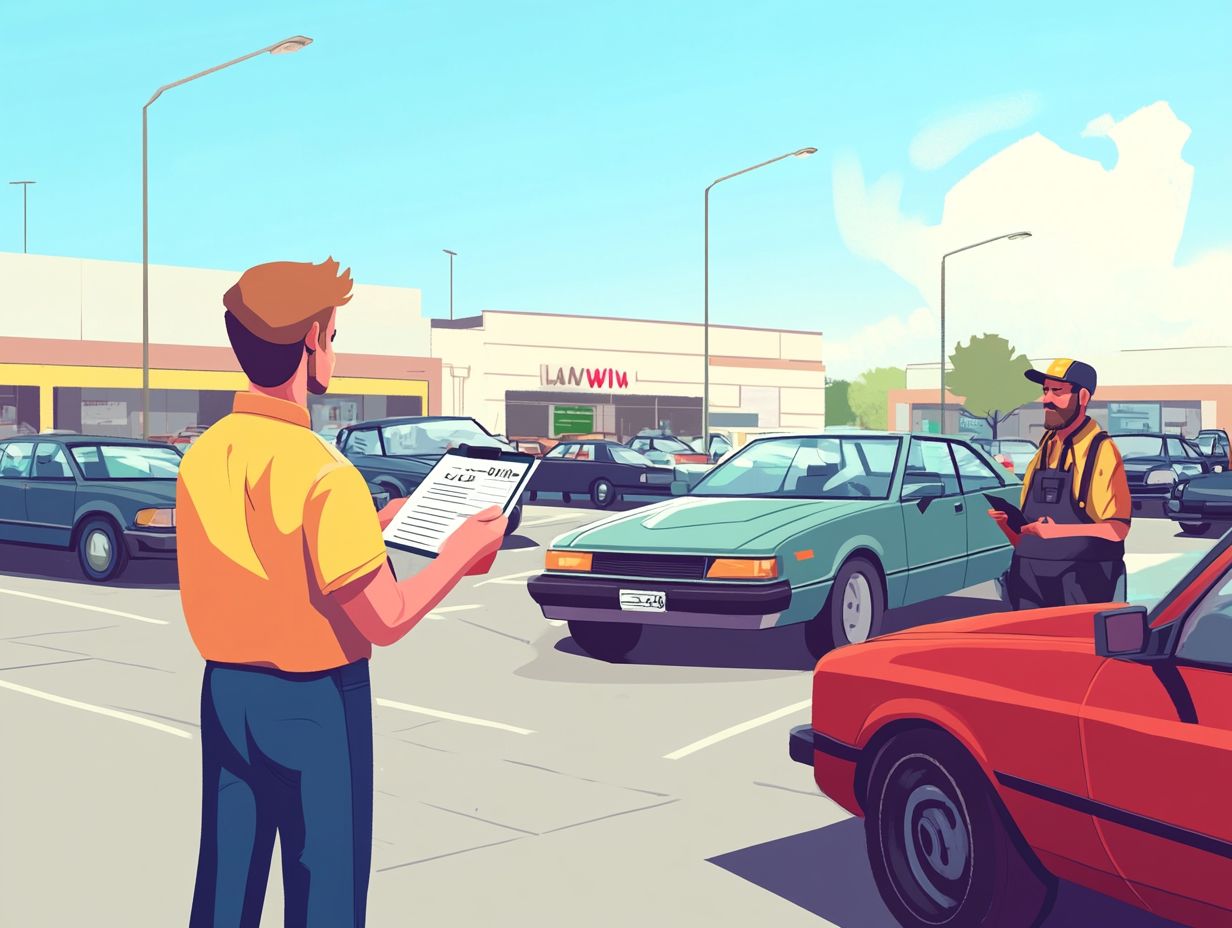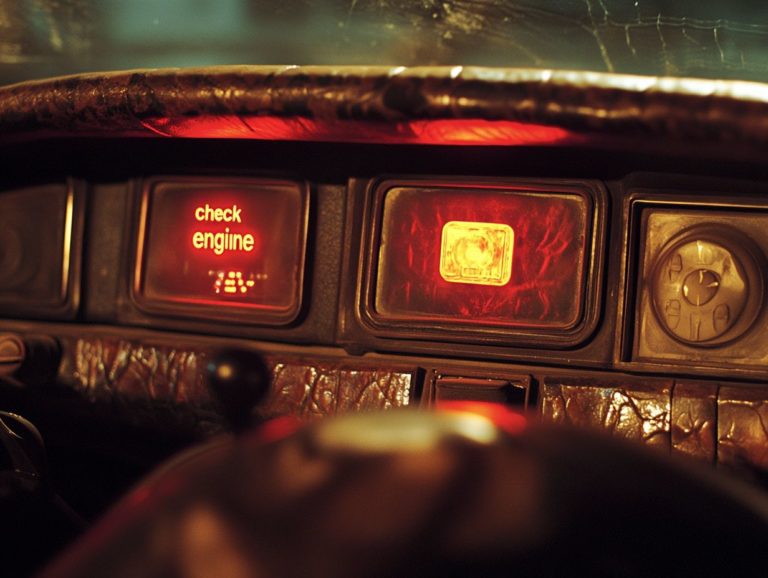Common Mistakes When Buying Used Cars
Purchasing a used car can evoke a blend of excitement and apprehension. With many options at your fingertips, it s easy to make choices that could lead to regret down the road.
From bypassing essential research to overlooking crucial inspections, many buyers pave the way for disappointment.
This article delves into the most frequent missteps encountered during the used car buying journey, offering valuable insights to help you navigate the process with confidence.
Whether you re a seasoned buyer or stepping into the market for the first time, this guide will empower you with the knowledge needed to make informed, confident decisions.
Contents
- Key Takeaways:
- 1. Not Doing Enough Research on the Car
- 2. Not Getting a Vehicle History Report
- 3. Skipping a Thorough Inspection
- 4. Not Considering the Total Cost of Ownership
- 5. Not Test Driving the Car
- 6. Not Negotiating the Price
- 7. Ignoring Red Flags
- 8. Not Checking for Recalls
- 9. Not Considering the Seller’s Reputation
- 10. Not Having a Mechanic Look Over the Car
- 11. Not Knowing the Market Value of the Car
- 12. Not Checking the Title and Registration
- 13. Not Considering the Insurance Costs
- 14. Not Getting a Warranty or Guarantee
- 15. Not Having a Clear Budget and Financing Plan
- What Are the Advantages of Buying a Used Car?
- Frequently Asked Questions
- What are some common mistakes people make when buying a used car?
- Is it a mistake to only focus on the price when buying a used car?
- Are there any red flags to watch out for when buying a used car?
- Should I buy a used car without test driving it first?
- Can I negotiate the price of a used car?
- Is it a mistake to buy a used car without a warranty?
Key Takeaways:

- Do thorough research on the car’s history, market value, and potential red flags before purchasing.
- Always get a vehicle history report and have a mechanic inspect the car to avoid any hidden issues.
- Consider the total cost of ownership, including insurance and potential repairs, before making a purchase decision.
1. Not Doing Enough Research on the Car
When you decide to buy a used car, skipping thorough research can lead to choices you might regret. It’s essential to tap into trustworthy resources like Kelley Blue Book and Edmunds, which provide insights into vehicle reliability, pricing, and features.
By utilizing platforms such as AutoTrader and CarsDirect, you can gain a comprehensive understanding of the market, empowering you to make informed decisions for your next vehicle purchase.
As you sift through reviews and ratings, compare prices across various online platforms to pinpoint the best deals. Evaluating the reliability ratings of different models ensures that your purchase lasts.
Always pay attention to safety features like airbags, anti-lock brakes, and crash test ratings they matter for your safety! Staying alert to common pitfalls, such as neglecting to check the vehicle’s history report or skipping a professional inspection, can save you from future headaches and unexpected expenses.
2. Not Getting a Vehicle History Report
A vehicle history report is a document that shows a car’s past, including accidents and ownership history. Companies like CARFAX and AutoCheck provide these essential reports before you purchase a used car.
This report contains crucial information to help you decide. Typically, it includes details about previous accidents, the number of prior owners, service history, and any reported thefts or recalls. By understanding this data, you empower yourself to make informed choices and steer clear of vehicles that may bring more headaches than they re worth.
As you dive into the report, keep an eye out for red flags like:
- Multiple accidents
- A salvage title
- Inconsistencies in mileage
If the report raises any concerns, don’t hesitate to request a mechanic s inspection. It can provide you with additional clarity and peace of mind about the vehicle’s true condition.
3. Skipping a Thorough Inspection
One of the most critical steps in purchasing a used car is ensuring it undergoes a comprehensive inspection by a certified mechanic. This meticulous examination can reveal hidden issues that might not be immediately apparent during a casual viewing.
This inspection dives deep into essential components, such as the engine, transmission, brakes, and suspension systems, guaranteeing that all parts are functioning as they should. Knowing the condition of these parts helps you avoid costly repairs later.
For instance, a mechanic’s keen eye can spot potential engine leaks, worn brake pads, or transmission fluid concerns issues that could lead to significant expenses shortly after the purchase.
Investing in this step will protect your wallet and peace of mind! By ensuring a thorough inspection, you position yourself to make informed decisions and sidestep unforeseen costs, enjoying the peace of mind that comes from knowing your investment is secure.
4. Not Considering the Total Cost of Ownership
When you’re in the market for a used car, it s vital to consider the total cost of ownership. This means looking beyond just the purchase price to include ongoing expenses like monthly payments, insurance, maintenance, and fuel efficiency.
By carefully evaluating these factors, you can gain a clearer picture of your long-term expenses. For example, a compact sedan may offer lower insurance rates and better fuel efficiency, while a larger SUV could come with higher maintenance costs due to its complexity.
Some car models are notorious for needing repairs, which can really impact your ownership costs. To budget effectively, it s smart to research not just the initial price, but also potential insurance premiums and average upkeep expenses. Creating a detailed spreadsheet to estimate these costs can help you understand the financial commitments tied to different vehicles.
5. Not Test Driving the Car
A test drive is an important step in your journey of buying a used car. It allows you to evaluate the vehicle s performance, comfort, and overall fit for your lifestyle, while also examining crucial safety features.
During this evaluation, pay close attention to how the car handles in various conditions, including acceleration, braking, and cornering. The noise levels from the engine or the road can provide insights into the vehicle s overall build quality. By putting the car through real-world scenarios, you’ll gain a clearer understanding of its reliability and how well it aligns with your daily driving needs.
This hands-on experience is crucial for making a well-informed investment in a used vehicle.
6. Not Negotiating the Price
Not negotiating the price can cost you money. It s crucial to research and understand the trade-in value and current market rates before stepping foot in a dealership.
By using resources like Kelley Blue Book, you can gather valuable insights into average prices for specific makes and models. This thorough research helps you identify a fair offer and lays a strong groundwork for your negotiation strategy.
Prepare compelling arguments that highlight any pricing discrepancies, signs of wear and tear on the vehicle, or other available options. Presenting comparable sales can bolster your position, giving you the confidence to secure a favorable deal that fits within your budget.
7. Ignoring Red Flags

Ignoring red flags during your used car buying journey can lead to serious headaches later on. It s essential to stay alert for potential issues highlighted in the vehicle history report and during the mechanic s inspection.
Watch for signs indicating the vehicle may have been in accidents, like misaligned panels or inconsistent paint jobs. Also, suspicious documentation such as missing routine maintenance records or discrepancies in mileage should raise alarms. Mechanical issues, like strange noises from the engine or warning lights flickering on the dashboard, are also not to be ignored.
If any of these red flags pop up, seek a second opinion from a trusted mechanic for a thorough inspection or request additional documentation. This helps guarantee you get a vehicle in good condition.
8. Not Checking for Recalls
Checking for recalls is an important step in your used car buying journey, ensuring that any safety concerns have been addressed. This protects your investment and enhances your vehicle’s reliability.
You can’t afford to overlook this step, as many cars on the road may have unresolved recalls jeopardizing their safety features. To find out if a vehicle has any outstanding recalls, visit the National Highway Traffic Safety Administration s website. There, you ll discover a user-friendly tool where you can easily input the Vehicle Identification Number (VIN).
This quick check reveals any recalls and shows whether they have been resolved. By taking this crucial step, you’ll empower yourself to make informed decisions and steer clear of potential hazards related to vehicle malfunction or failure.
9. Not Considering the Seller’s Reputation
To make a great purchase, do your homework on the seller’s reputation! The reputation of the seller plays a pivotal role in your used car buying journey. Understanding whether you’re dealing with a private seller or a dealership can significantly influence the trustworthiness of your transaction.
It s essential to conduct thorough research on the seller s reputation. Start by perusing online reviews on platforms like Google or Yelp, where past buyers often share their experiences. If possible, don t shy away from asking for references; firsthand accounts from previous customers can offer invaluable insights.
Being open and honest is key. A good seller will share all the car s history with you, including its condition and any repairs it may have undergone. This openness fosters trust and confidence in your decision-making process.
10. Not Having a Mechanic Look Over the Car
Having a qualified mechanic assess the used car before you make a purchase is absolutely essential for uncovering hidden issues that could translate into costly repairs later. This step is essential for any prudent buyer.
By selecting a trustworthy professional, you gain valuable insights into the vehicle’s condition and can identify any potential red flags. It s crucial that they examine key components like the engine, transmission, brakes, and suspension. They should also check for signs of rust or previous accidents. This thorough inspection can reveal hidden issues that you want to catch before it’s too late!
Investing in this pre-purchase check can ultimately save you a significant amount of money over time, as it may prevent unexpected breakdowns and repairs that could become financially burdensome.
11. Not Knowing the Market Value of the Car
Understanding the market value of a used car is crucial for making informed purchasing decisions. It gives you the power to negotiate effectively and sidestep the pitfalls of overpaying, particularly when you reference trusted resources like Kelley Blue Book.
Various online tools and platforms equip you with comprehensive pricing information, taking into account essential factors such as the vehicle’s make, model, year, and mileage. It’s important to evaluate the overall condition of the car. Any dents, mechanical issues, or signs of wear and tear can significantly impact its value.
By leveraging this wealth of data, you can enter negotiations with confidence, armed with a clear understanding of what constitutes a fair price. This not only strengthens your bargaining position but also helps you secure the best possible deal for your new ride.
12. Not Checking the Title and Registration
Before you purchase a used car, it’s crucial to check the title and registration to ensure that all documentation is legitimate and that there are no outstanding liens on the vehicle.
Doing this shields you from potential legal headaches and grants you peace of mind that comes with knowing the car has a clear history. When you verify the title, pay close attention to key details:
- Vehicle Identification Number (VIN) – a unique number used to identify each specific vehicle
- Owner’s name
- Odometer readings
Any discrepancies like mismatched VINs or unusual mileage could signal serious problems, such as Theft or Odometer Fraud.
An outstanding lien can indicate that the seller may not fully own the vehicle, complicating future ownership transfers. Therefore, conducting a thorough examination of these documents is essential for ensuring a smooth transaction.
13. Not Considering the Insurance Costs
Ignoring the potential insurance costs tied to a used car can lead to some unwelcome surprises. It s vital for you to factor these into your monthly payments and overall budget.
The type of vehicle you select can greatly affect your insurance premiums. Consider the make and model of the car, its safety features, and repair costs all of these elements come into play.
For example, if you re eyeing a sporty car or one that’s frequently stolen, be prepared for higher premiums. This calls for a thoughtful evaluation before you finalize your purchase.
Getting multiple insurance quotes before making a commitment can offer you valuable insight into what your ongoing costs might look like, empowering you to make informed decisions.
Budgeting for these expenses not only helps you maintain financial stability but also ensures a smoother ownership experience, saving you from unexpected headaches down the road.
14. Not Getting a Warranty or Guarantee

Failing to secure a warranty or guarantee when purchasing a used car can leave you exposed to unexpected repair costs. Don t miss out on securing a warranty; it protects you from potential mechanical failures!
Many sellers offer a range of warranties, each differing in coverage and duration, allowing you to select a plan that perfectly aligns with your needs.
Warranties for used vehicles typically fall into two main types:
- Powertrain warranties, which cover essential components like the engine and transmission.
- Bumper-to-bumper warranties, offering more comprehensive protection that encompasses nearly all parts of the vehicle.
Securing a warranty not only shields you from potential mechanical failures but also bolsters your confidence in the buying decision. It ensures that unforeseen expenses won t derail your budget.
15. Not Having a Clear Budget and Financing Plan
Having a clear budget and financing plan is essential when purchasing a used car. This approach ensures you stay within your financial means while making informed choices about monthly payments and financing options.
To create an effective budget, consider not just the purchase price, but also the additional costs that come with car ownership, such as insurance, maintenance, fuel, and registration fees.
Using an auto loan calculator a tool to help you understand what your monthly payments will be can be a game-changer in this process. It helps you estimate your monthly payments and total loan costs based on different interest rates and loan terms.
Exploring various financing options whether through credit unions, banks, or dealer financing can uncover opportunities to reduce costs and secure the most favorable rates. This approach improves your buying experience, making it not just a purchase, but a wise investment.
What Are the Advantages of Buying a Used Car?
Buying a used car comes with fantastic benefits that you won t want to miss! You ll enjoy significant cost savings on the purchase price, experience lower depreciation rates, and often benefit from enhanced vehicle reliability and safety features compared to their new counterparts.
Opting for a pre-owned vehicle typically translates to a lower upfront cost, but that s just the beginning. You might also find yourself saving on registration fees, which frequently vary based on the car s age and value.
For example, some states charge considerably less to register a vehicle that s a few years older, offering you even more financial relief.
You ll likely be thrilled to discover that used cars often come loaded with premium features, like cutting-edge safety technologies and sophisticated infotainment systems, all at a fraction of the original price.
Recent reports suggest that the average person can save over $10,000 by choosing a used car over a new one, giving you more cash to invest in things that truly matter!
What Are the Disadvantages of Buying a Used Car?
Buying a used car has its perks, but you can’t overlook the potential drawbacks. To avoid problems, it’s crucial to learn how to spot a lemon, as hidden issues may remain concealed without a thorough vehicle history report or a mechanical inspection.
The lack of a warranty can be a significant concern. This leaves you exposed to unexpected repair costs, often stemming from wear and tear or past accidents that may not be immediately obvious. In contrast, newer models typically come with the manufacturer s assurance, offering peace of mind that used vehicles don t provide.
To navigate these challenges, conduct diligent research. Compare various options and consider ratings and reviews. A detailed inspection by a trusted mechanic can help uncover any red flags, ensuring you make a well-informed decision.
How Can a Buyer Avoid These Common Mistakes?
To avoid common mistakes when buying a used car, prioritize thorough research. Understanding how to prepare for buying a used car includes conducting vehicle history checks and ensuring a comprehensive mechanical inspection before finalizing your purchase.
Creating a checklist can help you track essential features and potential red flags throughout the car-buying journey. Use reputable resources like consumer reviews and guidebooks for valuable insights into the vehicle’s reliability and performance.
You should always check the vehicle’s history and take it for a test drive. Thorough background checks can significantly minimize the risk of unexpected repairs and expenses after the sale. By following these steps, you can navigate the used car market with greater confidence.
What Are the Legal Protections for Buyers of Used Cars?
Understanding your legal protections as a buyer of used cars is essential. These rights are your shield against fraud and your path to transparency in transactions.
One significant aspect is the Lemon Law. This law helps you if you buy a car with major problems the dealer won’t fix. It can alleviate the frustration that often accompanies faulty automobiles.
The Truth in Lending Act requires clear disclosure of loan terms and conditions, giving you the power to make informed decisions about your financing options.
Familiarizing yourself with these rights allows you to navigate disputes confidently. Equip yourself to assert your interests whenever issues arise.
What Are the Most Important Things to Look for in a Used Car?
When evaluating a used car, several crucial factors demand your attention. Look closely at the vehicle’s condition, safety features, and the results of a mechanical inspection to ensure a wise investment.
Pay attention to the mileage, as it significantly impacts both the car’s performance and longevity. A well-documented service history reveals how well the vehicle has been maintained over the years.
Carefully assess the overall condition of the car, from exterior and interior wear to the state of the tires and brakes. Your priorities will depend on your individual needs and preferences.
If you commute frequently, you might value reliability and fuel efficiency over aesthetic appeal. Conversely, if you seek a car for leisurely weekend outings, you may prioritize features like entertainment systems and comfort.
Frequently Asked Questions

Watch this video for more tips on buying a used car!
What are some common mistakes people make when buying a used car?
One common mistake is not researching the car’s history, including maintenance records and previous accidents. To avoid this, it’s important to know what to check before buying a used car. Another mistake is not getting a proper inspection done by a mechanic before purchasing.
Is it a mistake to only focus on the price when buying a used car?
Yes, focusing only on price is a mistake. You must also consider the car’s condition, mileage, and any hidden costs like repairs or maintenance.
Are there any red flags to watch out for when buying a used car?
Absolutely! Look out for several warning signs. These include a lack of maintenance records, a title indicating the car was damaged and rebuilt, and a seller who is reluctant to let you take the car for an independent inspection.
Should I buy a used car without test driving it first?
No way! You should always test drive a used car first. It s your chance to feel how it drives and spot any potential issues.
Can I negotiate the price of a used car?
Yes, you can definitely negotiate the price of a used car. Research the market value beforehand and use that information to strike a fair deal with the seller.
Is it a mistake to buy a used car without a warranty?
Generally, yes! Buying without a warranty can lead to costly repairs. Ensure you re covered for peace of mind, especially if you re not buying from a trusted dealer.






